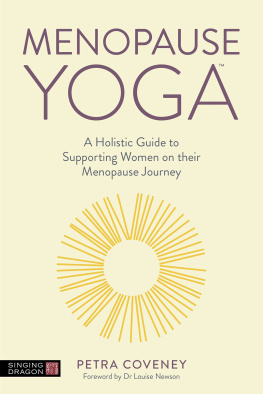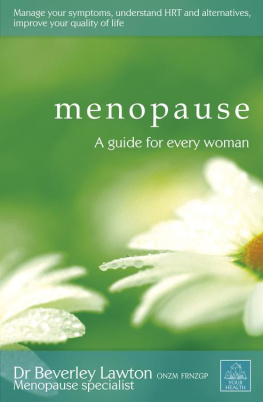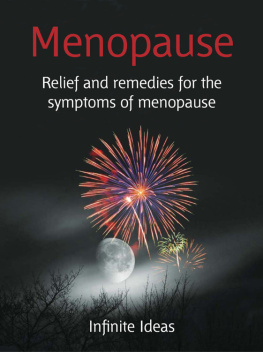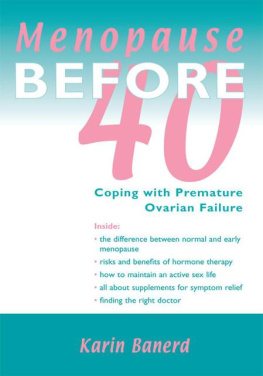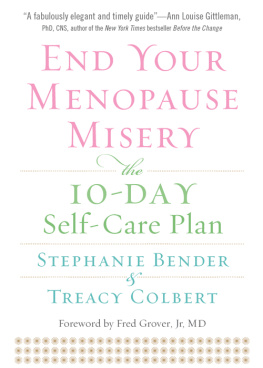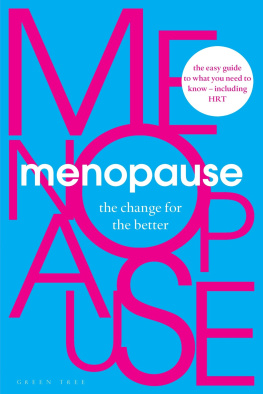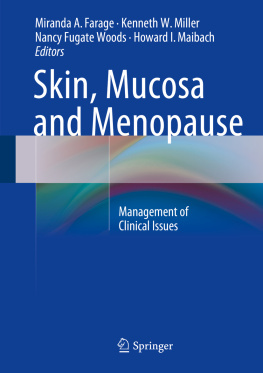Published in 1997 by
Routledge
711 Third Avenue,
New York, NY 10017
Published in Great Britain by
Routledge
2 Park Square, Milton Park,
Abingdon, Oxon, 0X14 4RN
Transferred to Digital Printing 2011
Copyright 1997 by Routledge
All rights reserved. No part of this book may be reprinted or reproduced or utilized in any form or by any electronic, mechanical, or other means, now known or hereafter invented, including photocopying and recording or in any information storage or retrieval system, without permission in writing from the publishers.
Library of Congress Cataloging-in-Publication Data
Reinterpreting menopause : cultural and philosophical issues / edited
by Paul A. Komesaroff, Philipa Rothfield, and Jeanne Daly.
p. cm.
Includes bibliographical references.
ISBN 0-415-91564-3 (cloth). ISBN 0-415-91565-1 (paper)
1. Menopause. 2. Middle aged womenHealth and hygiene.
3. Middle aged womenPsychology. I. Komesaroff, Paul A.
II. Rothfield, Philipa. III. Daly, Jeanne.
[DNLM: 1. Menopause. 2. Women. WP 580 R374 1996]
RG186.R36 1996
612.6'65dc20
DNLM/DLC
| for Library of Congress | 96-28892
CIP |
Publisher's Note
The publisher has gone to great lengths to ensure the quality of this reprint but points out that some imperfections in the original may be apparent.
Mapping Menopause
Objectivity or Multiplicity?
Paul A. Komesaroff, Philipa Rothfield, and Jeanne Daly
Does the menopause exist? Certainly, from a point of view widely adopted within medicine, it does. For many practitioners and researchers, menopause is to be understood as a purely technical phenomenon. From this viewpoint, it can be satisfactorily described in terms of hormonal changes and their accompanying effects. In particular, according to a popular view, a decline in the circulating levels of the female hormone estrogen is responsible for most of the acute symptoms of menopause and for the epidemiologically defined increase in the risk of certain conditions. Menopause is therefore considered a deficiency disease for which a cure is neededthe logical remedy taking the form of hormonal supplementation or replacement.
This account of menopause, which constitutes one of the orthodoxies of modern medicine, is widely familiar today. It is not, however, uncontested. Informally, many women in midlife have sought other explanations for the changes they experience. In recent years a substantial body of writing has developed that takes issue, both implicitly and explicitly, with the medical view of menopause. The factual bases for the claims about the physical and other changes associated with menopause and the effects of the various available hormonal treatments are matters of continuing controversy. The limitations of approaches that conceptualize complex fields of experience and behavior exclusively in biological terms are increasingly being recognized. The social presuppositions and political outcomes of these and other reductionist theories are today subjected to vigorous criticism.
This process of questioning has drawn on a variety of theoretical traditions and perspectives, including feminist theory, politics, philosophy, sociology, psychology, and anthropology. One of the major strategies of feminist discussions of In other words, the critical examination of menopause has exposed to investigation not only the contents of discourses about menopause but also the various metadiscursive contexts within which they operate. As a consequence of these engagements, women in midlife are able to strategically avail themselves of these multiple perspectives that contest the apparent singularity of the biomedical model.
Science, Knowledge, Culture
How does the biomedical rendition of menopause manage to maintain such a position of influence? The cogency of science resides in part in its adherence to facts, the stuff of the objective world. This applies to all objects of scientific study, whether, for example, elementary particles, plants, or women's bodies. Yet one of the main insights of recent philosophy of science has been the recognition that science is a cultural practice. The cultural character of science pertains to the epistemology with which it operates (the kinds of knowledge it practices) and the social functions it performs. This has implications regarding that which can be knownthe object of scientific knowledge. By recognizing the cultural aspects at work here, scientific discourses themselves can be seen as strategies for the construction of objects of investigation, producing techniques for studying them, and the criteria for successful research. Accordingly, they entail the establishment of particular notions of objectivity and truth. They also entail comprehensive evaluative apparatuses, usually codified within ethical systems.
The scientific and medical discourses involving women's bodies are no exception here. In this volume, Emily Martin argues that throughout most of the twentieth century, women's bodies have been conceptualized as machines designed to produce products. Medicine's mechanistic body has been traced to scientific elaborations upon Descartes distinction between the mind and the body, otherwise known as Cartesian dualism. The sexual specificity of the female body adds something more to the mechanistic metaphor. The element of productivity is doubly emphasized with respect to the feminine body such that not only is the machine conceived in terms of human activity (productivity), it is also expected to reproduce (to produce other machines) smoothly and consistently. In line with these metaphors, menstruation will tend to be seen as a breakdown of continuous functioningmore precisely, as the moment of failure to produce a baby. Likewise, menopause comes to be seen as a breakdown of the machine's reproductive capacity, inaugurating an inexorable slide into uselessness and disrepair.
Metaphors of Female Corporeality
One way of contesting dominant discourses of women's bodies is to produce other metaphors of feminine corporeality. Alternative descriptions of the female body are able to yield different understandings, which need not rely upon the machine, its products, and its moments of breakdown. Alongside the view of the body as a machine, a number of sharply divergent sets of metaphors have recently arisen that are challenging accepted ways of understanding physiological functioning. Among these are forms of systems theory such as chaos theory, nonlinear dynamics, and complexity theory. Such conceptual models have already been applied with suggestive outcomes in some areas of clinical research, including cardiology, oncology, and immunology. Martin argues that it is possible also to regard menopause, and the female reproductive system in general, in terms of these paradigms. When one does so, the aspect that, from the mechanical view, is described as breakdown and failure, presents itself instead as a discontinuous change of state. The singularity of reproduction as the mode of production and teleology of feminine corporeality no longer follows according to some essential bodily logic. The transitions associated with menopause appear not as moves from order into disorder, but as moves from one kind of order to another. It is arguable that the full development of these novel theoretical perspectives could have an important practical impact on the medical treatment of meno-pause, as well as on the ways in which individual women experience it.


